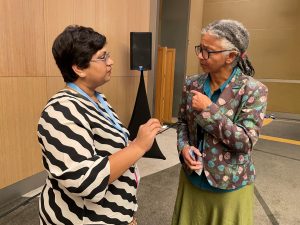ESA at COP28: Postscript
By Dennis Ojima & Gillian Bowser
Dubai, UAE
So the COP28 in Dubai ended with mixed fanfare on December 13. However, to be fair to the Parties (i.e., nations) and the COP, significant progress was made. We should be reminded that the COP of the UNFCCC is a process that is nearing its thirty-year milestone and the UN process for these deliberations is a consensus decision process. This process is cumbersome for sure but ensures fairness and inclusion as a guiding principle—one embraced by developing nations as a mechanism to balance all voices in UN processes (it is worth noting that the consensus doctrine is true for all UN conventions and governing bodies with the exception of the Security Council).

Dr. Gillian Bowser, pictured right, is a wildlife ecologist and associate professor at Colorado State University’s Natural Resource Ecology Lab. She networked with a number of groups and individuals during the COP28 workshop.
As one reflects on the final decision taken in Dubai, we see some issues reaffirmed and renewed commitment to others. First and foremost, commitment to reduce emissions in an attempt to not exceed 1.5oC over pre-industrial global temperatures with a transition away from fossil fuels. The science behind the cause of climate change is certain, and reaffirmed in the UAE Consensus as the decision document for COP28. All Parties accept that the impacts of climate change are observable and global reaching communities in all countries. Parties accept the strong need to focus on how adaptation to climate change is as urgent as reducing emissions; and that Parties are already facing impacts from a warming environment and these will only become worse in the coming decades.
Watching the deliberations unfold during the COP, we were provided a glimpse of the complexity of these decisions and the important nuances of the weighty decisions made during any of the COP’s. For instance, the issue to include wording related to phasing out fossils fuels was hotly debated and various groups aligned in ways not initially understood. One argument stated that the Paris Agreement did not target sources, but only dealt with emission reductions. Another set of Parties pointed out that they had started on a development pathway several decades ago, utilizing the best available technologies which were mostly reliant on fossil fuel consumption. Currently, they are burdened with significant debt, and only in recent years, as well as in the years to come, do they have any possibility of paying off some of the debt. Consequently, phasing out fossil fuels would significantly impact their economy and the well-being of their populations. An associated argument was added that the phase out would go against the principle of nationally determined contributions (NDC), and that Parties should be allowed to determine their own path to emissions reduction and provide transparent accounting of these actions. Another issue associated with fossil fuel phase-out was the question of applying this to all fossil fuels or only to unabated fossil fuels. The compromise was to “phase-down” unabated coal power and phase out inefficient fossil fuel subsidies. Though far short of setting a timeline for ending our reliance on fossil fuel consumption, it does provide guidance on emission reduction strategies.
The COP28 clarified the need for adaptation strategies and mechanisms for financing them. The statements made include the emphasis on the “importance of conserving, protecting and restoring nature and ecosystems” and “conserving biodiversity, while ensuring social and environmental safeguards.” The UAE consensus states: “Reducing climate impacts on ecosystems and accelerating the use of ecosystem-based adaptation and nature-based solutions, including through management, enhancement, restoration and conservation and the protection of terrestrial, inland water, marine and coastal ecosystems.” These approaches are part of an “iterative cycle for building adaptive capacity, strengthening resilience and reducing vulnerability.” It also “encourages integrated, multi-sectoral solutions, such as land-use management, sustainable agriculture, resilient food systems, and nature-based solutions and ecosystem-based approaches.”
So one should not quibble over the work not completed in Dubai, but one should see what significant steps forward were taken and note that this is an ongoing process to deal with an existential problem facing humanity. So progress is good, but prudent to monitor further actions in the next COP29 in 2024.